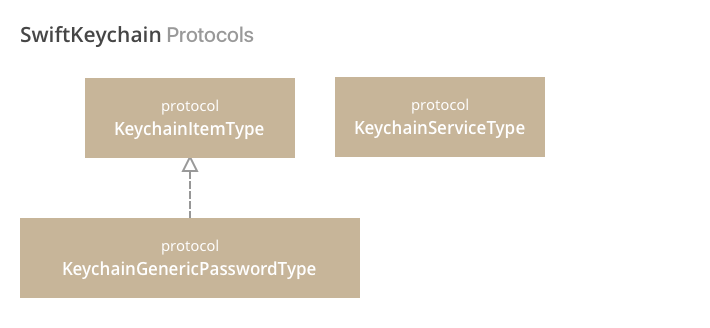Swift wrapper for working with the Keychain API implemented with Protocol Oriented Programming.
You create an implementation of the KeychainGenericPasswordType protocol that encapsulates the data that you want to store in the Keychain. Most of the implementation is done for you by using default protocol implementations, such as setting the default service name and access mode (kSecAttrAccessibleWhenUnlocked).
Then you call the KeychainItemType methods to save, remove or fetch the item from the provided as argument KeychainServiceType protocol implementation.
Let's say we want to store the access token and username for an Instagram account in the Keychain:
struct InstagramAccount: KeychainGenericPasswordType {
let accountName: String
let token: String
var data = [String: AnyObject]()
var dataToStore: [String: AnyObject] {
return ["token": token]
}
var accessToken: String? {
return data["token"] as? String
}
init(name: String, accessToken: String = "") {
accountName = name
token = accessToken
}
}In var dataToStore: [String: AnyObject] you return the Dictionary that you want to be saved in the Keychain and when you fetch the item from the Keychain its data will be populated in your var data: [String: AnyObject] property.
let newAccount = InstagramAccount(name: "John", accessToken: "123456")
do {
try newAccount.saveInKeychain()
} catch {
print(error)
}Note: The provided implementation of the KeychainServiceType protocol will replace the item if it already exists in the Keychain database.
let account = InstagramAccount(name: "John")
do {
try account.removeFromKeychain()
} catch {
print(error)
}var account = InstagramAccount(name: "John")
do {
try account.fetchFromKeychain()
if let token = account.accessToken {
print("name: \(account.accountName), token: \(token)")
}
} catch {
print(error)
}SwiftKeychain requires Swift 2.0 and Xcode 7 and supports iOS, OSX, watchOS and tvOS.
Copy the Keychain/Keychain.swift file to your project.
Add the following line to your Cartfile
github "yankodimitrov/SwiftKeychain" "master"Add the following line to your Podfile
pod “SwiftKeychain”SwiftKeychain is released under the MIT license. See the LICENSE.txt file for more info.


